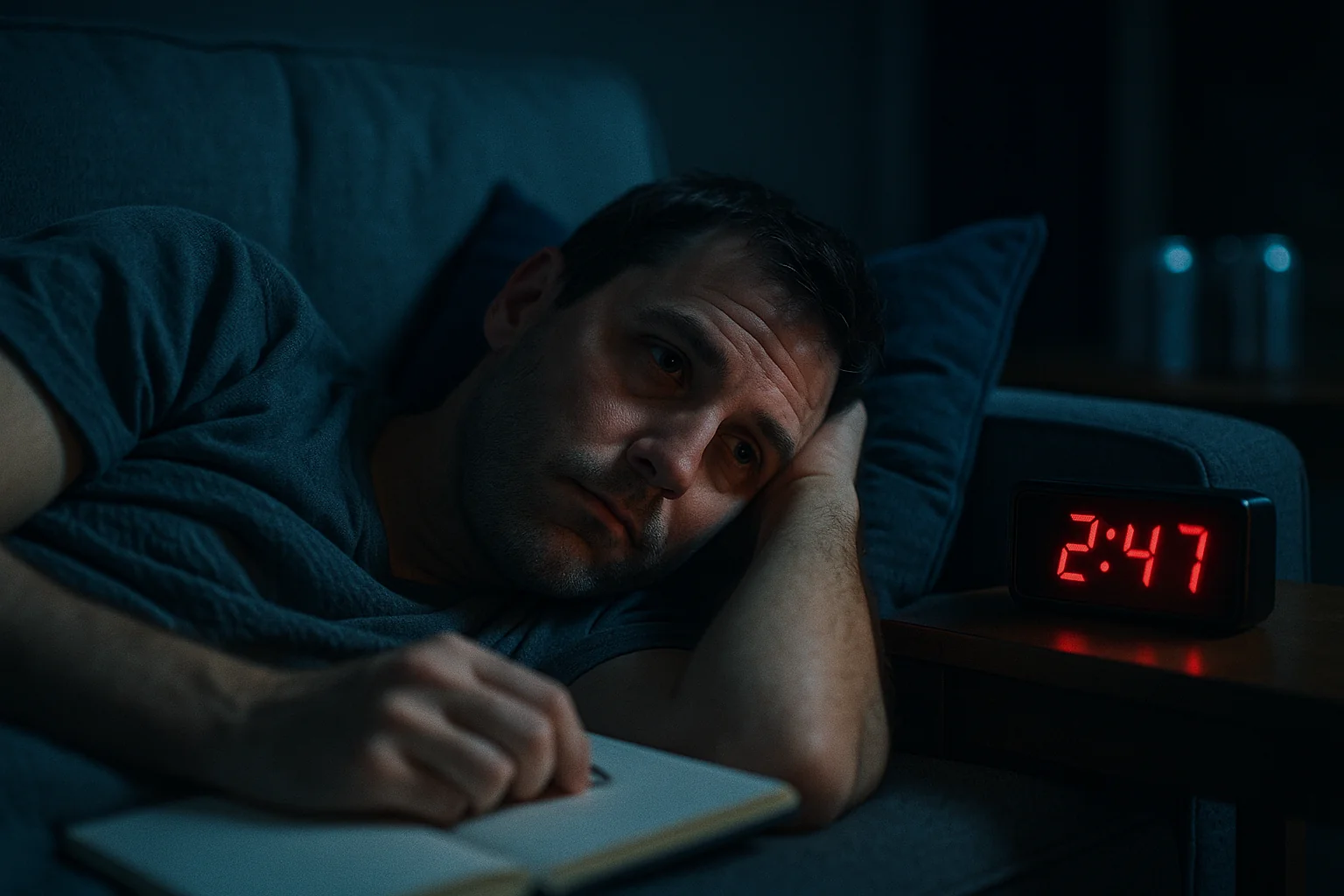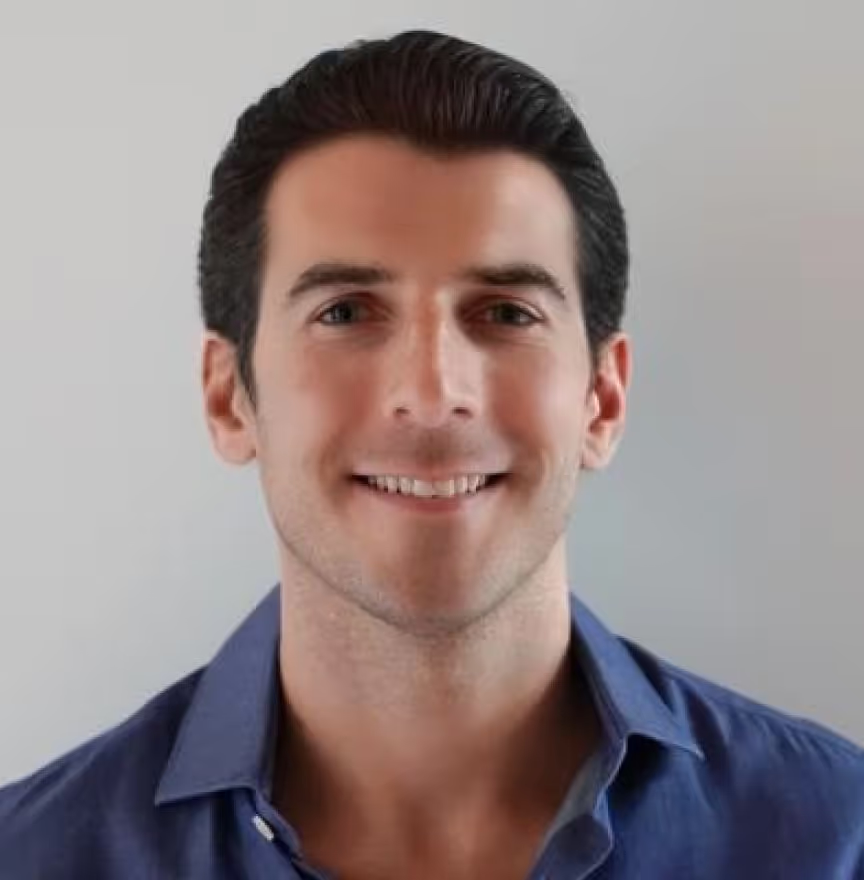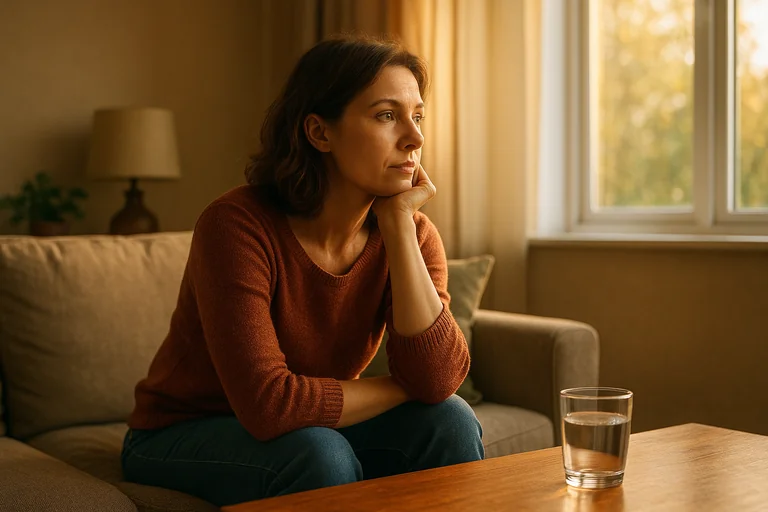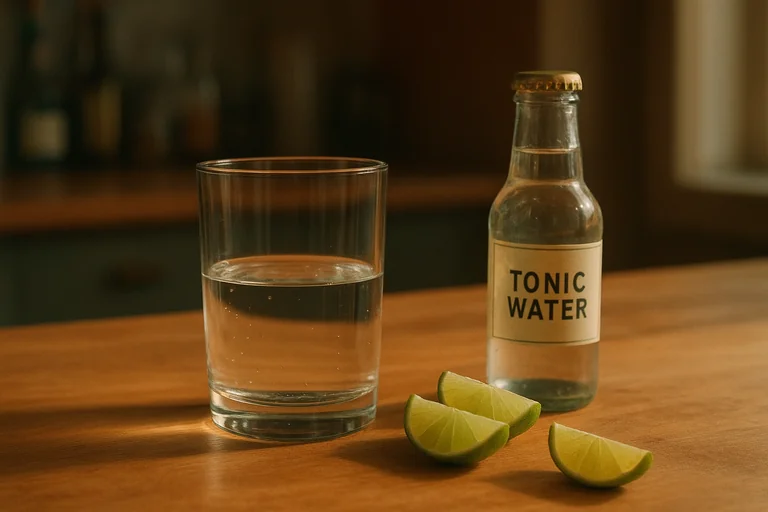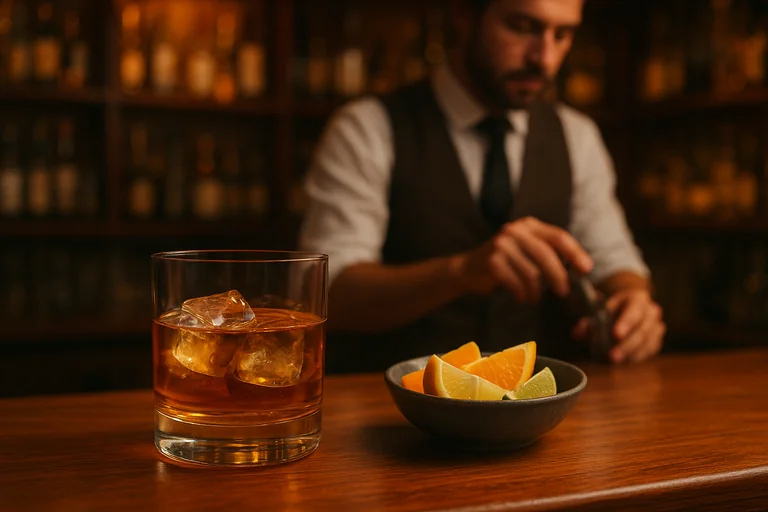A 2 minute assessment to get a personalized mental health or alcohol recovery plan.
Alcohol can make you sleepy fast but wrecks the rest of the night through REM suppression, later REM rebound, and frequent awakenings, leaving you with lighter, fragmented sleep and next-day fatigue and anxiety despite appearing to help you fall asleep.
What You'll Discover:
- Why alcohol makes you drowsy but destroys sleep quality later in the night
- How REM suppression and rebound create vivid dreams and frequent awakenings
- The link between alcohol and sleep apnea, with 25 percent higher OSA risk
- Why alcohol suppresses melatonin and throws off your body clock
- Practical strategies to protect sleep if you choose to drink
- Evidence-based treatment options including naltrexone when cutting back is difficult
Alcohol can make you sleepy fast, but it wrecks the rest of the night: early sedation, then REM suppression, and later REM rebound with frequent awakenings and vivid dreams. Net result: lighter, fragmented sleep and next-day fatigue/anxiety. Even moderate evening doses can alter sleep physiology and aggravate snoring or sleep apnea; higher intake is linked to about 25 percent higher risk of obstructive sleep apnea (OSA).
Alcohol can suppress melatonin and nudge your body clock off schedule, adding jet-lag-like effects to the fragmentation. Tolerance to alcohol's sedating effect develops quickly, so the "nightcap" tends to creep upward while sleep quality gets worse.
All that said, if cutting back is hard, behavioral support plus (when appropriate) naltrexone oral tablets can reduce heavy-drinking days and craving, often the fastest path to better sleep.
With that in mind, here's exactly what happens when you combine sleeping and alcohol, why the nightcap backfires, and how to protect your sleep whether you drink or not.
The truth behind alcohol helps me sleep
It's easy to believe a drink "helps you sleep" because alcohol is a central nervous system depressant. In the first part of the night it shortens sleep-onset latency (you fall asleep faster) and may increase slow-wave sleep briefly. But that benefit is front-loaded and comes at a cost: as alcohol is metabolized, you get lighter sleep, more awakenings, and REM rebound (intense dreams, tossing, turning). The net effect is poorer sleep continuity and worse next-day function even if total time in bed looks adequate.
What changes under the hood - First half: faster sleep onset; REM suppression; sometimes more early slow-wave sleep. Second half: REM rebound and frequent awakenings as blood alcohol level falls; heart rate runs a little hotter; sleep feels "choppy." Across the night: more stage N1 (light) sleep, less efficient sleep overall; in heavy users and in withdrawal, disturbances can persist for weeks.
Bottom line: alcohol trades quick sedation for poor architecture, and your brain notices the trade the next morning.
Why alcohol makes you sleepy (and then wakes you up)
A surge in sleep pressure at the wrong time - Alcohol pushes adenosine and GABAergic signaling, making you feel drowsy and helping you doze off. Because this surge is mis-timed relative to your circadian rhythm, it wears off as alcohol clears, and you wake, often around 2 to 4 a.m.
REM suppression then REM rebound - Early REM suppression builds pressure for rebound later, more vivid dreams and lighter, jittery sleep in the second half of the night. This is documented both in controlled studies and in alcohol withdrawal.
Airway relaxation and snoring - Alcohol relaxes upper-airway muscles and raises the arousal threshold, so snoring gets louder and breathing interruptions (apneas) are more likely. Meta-analysis: higher alcohol intake leads to about 25 percent higher OSA risk. In people with OSA, alcohol worsens events and oxygen drops.
Melatonin suppression and circadian static - A randomized study found that an evening dose of alcohol reduced salivary melatonin by about 15 to 19 percent several hours after drinking. Lower melatonin can delay your sleep timing and degrade consolidation, especially if you also go to bed later after social events.
Rapid tolerance - Within a few nights, brains adapt; the "knockout" effect fades. Many people increase dose or drink earlier, but that magnifies fragmentation and next-day sleepiness, an insomnia trap.
Sleeping and alcohol - what a typical night looks like
Evening drinks (happy hour or dinner): You feel relaxed and drowsy; bedtime slides later. Sleep onset: You fall asleep quickly. REM is suppressed early. 2 to 4 a.m.: Alcohol clears; REM rebounds; heart rate ticked up; more awakenings and bathroom trips. Morning: Sleep inertia, brain fog, irritability or "hangxiety." Performance suffers even if your tracker shows 7 to 8 hours.
Alcohol, insomnia, and next-day performance
Alcohol interacts with prior sleep restriction: if you're already short on sleep, a few drinks amplify next-day sleepiness and cognitive lapses. That's one reason "just one social night" can tank productivity. Reviews of alcohol and sleep consistently recommend not using alcohol as a sleep aid.
In chronic heavy use or AUD: persistent reductions in sleep efficiency, more awakenings, and abnormal stage distribution (elevated REM pressure) can last into early abstinence, and poor sleep can also increase relapse risk. Treating the alcohol pattern and the sleep problem yields the best outcomes.
Snoring and sleep apnea - alcohol makes it worse
Mechanism: Alcohol relaxes the tongue and pharyngeal muscles and raises the arousal threshold, so the brain responds slower to blocked breaths. Result: more and longer apneas/hypopneas, louder snoring, and deeper oxygen dips. Evidence: Systematic review and meta-analysis showed risk ratio 1.25 for OSA in higher-intake groups versus none. If you already have OSA (diagnosed or suspected), drinking, especially close to bedtime, worsens severity.
What to do if you snore or gasp at night: Don't rely on guesswork. Ask your clinician about home sleep testing; treating OSA (CPAP, oral appliance, or positional therapy) improves sleep quality and reduces alcohol-related breathing effects. Cut off alcohol 3 to 4 hours or more before bed even on treatment.
How much alcohol does it take to disrupt sleep
Dose and timing matter more than drink type. Low to moderate doses still alter architecture (shorter sleep latency, REM reduction early, fragmentation later). Higher doses cause more dramatic REM suppression, wake after sleep onset, and next-day impairment. Late timing compounds the problem: the closer to bedtime, the stronger the second-half disruption.
Wine versus beer versus spirits? For sleep, ethanol drives the physiology; congeners may tweak hangover feel but don't rescue sleep architecture.
If you drink and want better sleep - a practical, research-based plan
Move alcohol earlier and lower - Set a cut-off: finish drinks 3 to 4 hours or more before lights out. This minimizes REM suppression and 3 a.m. wake-ups. Cap to 1 to 2 standard drinks (14 g alcohol each) on social nights and avoid binges; spacing at 1 drink or less per hour helps. (Standard drink sizes: about 5 oz wine, 12 oz 5 percent beer, 1.5 oz 80-proof spirit.)
Protect your circadian rhythm - Keep a fixed wake time (even after late nights) and get morning bright light; this corrects drift without a nightcap. If your schedule allows, anchor a consistent dinner time; avoid late meals plus drinks, which can nudge melatonin and temperature rhythms. Alcohol can suppress melatonin, don't stack the deck against sleep.
Build a real wind-down (not a pour-down) - 30 to 45 minutes of dim light and low arousal: shower, light reading, stretching, breathwork, or a short journal dump. Keep the bed for sleep and sex; shift doomscrolling to the couch and end it 1 hour before bed.
Strategize snoring/OSA - If you snore, wake unrefreshed, or have morning headaches, especially if you drink, get screened for OSA. Treating OSA plus moving alcohol earlier is often a game changer.
Fix the insomnia loop without alcohol - Consider CBT-I principles: stimulus control, sleep-restriction therapy with careful guidance, and cognitive tools for "tired and wired" nights. Alcohol masks the problem short-term and feeds it long-term. Reviews are unequivocal: don't use alcohol as a sleep aid.
If you're cutting back and keep bouncing back - This isn't just willpower. Alcohol's reinforcement circuitry is sticky in predictable windows (after work, post-conflict). A clinician can help map triggers, set limits, and align routines. For many adults who are medically appropriate, naltrexone oral tablets, paired with counseling, reduce heavy-drinking days and craving, which often unlocks sleep improvements (fewer binges, earlier cut-offs). Your clinician will screen for contraindications (current opioid use/dependence, acute hepatitis or liver failure) and discuss dosing (commonly 50 mg/day).
Safety note: If you've been drinking heavily, don't stop abruptly without medical guidance. Withdrawal can be dangerous and sometimes requires supervised care before longer-term sleep work. For support and referrals in the U.S., SAMHSA's National Helpline is 1-800-662-HELP (4357).
Special scenarios
Shift work and travel - Alcohol plus circadian misalignment is a two-hit combo. If you must shift your schedule, use light, timing, and caffeine strategically; avoid alcohol as a "sledgehammer" for sleep. It may knock you out but destabilizes a clock you're already trying to steer.
Perimenopause and midlife sleep disruption - Hot flashes, mood shifts, and OSA risk increase in midlife. Alcohol can worsen flushes and arousals, and it amplifies snoring and apneas. Cutting back (or a firm evening cut-off) frequently pays outsized dividends.
Teens and young adults - Developing brains, late chronotypes, and social patterns (pre-gaming, shots) make late, heavy episodes common, exactly the pattern that trashes the second half of the night and next-day learning. Data in late adolescents show dose-dependent REM disruption; steering toward early cut-offs and alcohol-free nights is protective.
Frequently asked questions
Is a small nightcap okay if I'm desperate? - Even modest doses reshape architecture: faster sleep onset but REM suppression and later fragmentation. If you must drink on a given night, finish 3 to 4 hours or more before bed and keep to one standard drink; better yet, build a non-alcohol wind-down.
Why do I wake at 3 a.m. with a racing heart? - As BAC falls, your nervous system rebounds and REM pressure surges. The result: lighter sleep, more dreams, micro-awakenings, and a "wired-tired" feel. Alcohol also increases nocturia, so bathroom trips stack disruptions.
Is wine better than whiskey for sleep? - Not really. Ethanol drives the changes across beverages. Congeners alter hangover feel, but the sleep impact tracks dose and timing.
I don't snore - do I still need to worry? - Yes. Snoring/OSA is one pathway, but architecture changes (REM suppression to rebound) and melatonin suppression affect many drinkers. If daytime fog, headaches, or "hangxiety" are common after drinking, your sleep is taking a hit.
How long until sleep improves if I reduce or stop? - Often within days to weeks you'll see fewer early-morning awakenings and steadier energy. In heavy/chronic use, deeper normalization can take weeks; addressing both alcohol patterns and sleep habits speeds recovery.
Can I use alcohol to reset after a few bad nights? - Tempting, but counterproductive. Reviews consistently advise against alcohol as a sleep aid; it magnifies the very fragmentation that caused the slump. Use morning light, stable wake times, short naps (20 to 30 min, before 3 p.m.), and a calm wind-down.
A one-page playbook to sleep better without alcohol
Set your guardrails - Cut-off: last drink 3 to 4 hours or more pre-bed. Cap: 0 to 1 on routine nights; 1 to 2 on occasional social nights; never binge. Pace: 1 drink or less per hour with water between.
Anchor your clock - Fixed wake time daily; bright morning light for 15 to 30 minutes. Keep dinner earlier; avoid stacking late meals plus late drinks.
Upgrade the wind-down - 30 to 45 minutes: dim lights, screens off, shower, stretch, or read. Bedroom equals sleep and sex; park planning and messages elsewhere.
Screen and treat snoring/OSA - If snoring, witnessed apneas, or unrefreshing sleep: ask for home sleep testing. Keep alcohol early even on therapy.
Get help if needed - If your caps won't stick or binges keep happening, bring it up with a clinician. For many, naltrexone oral tablets plus counseling reduce heavy drinking and make sleep changes finally stick. For referrals, call 1-800-662-HELP (4357).
Ready to understand where you stand?
Want a private read on your pattern and how much better your sleep could get with small changes? Our quick, confidential alcohol assessment gives you a research-based readout you can share with your clinician, plus a personalized sleep-first plan.
Start your 3-minute alcohol use assessment
